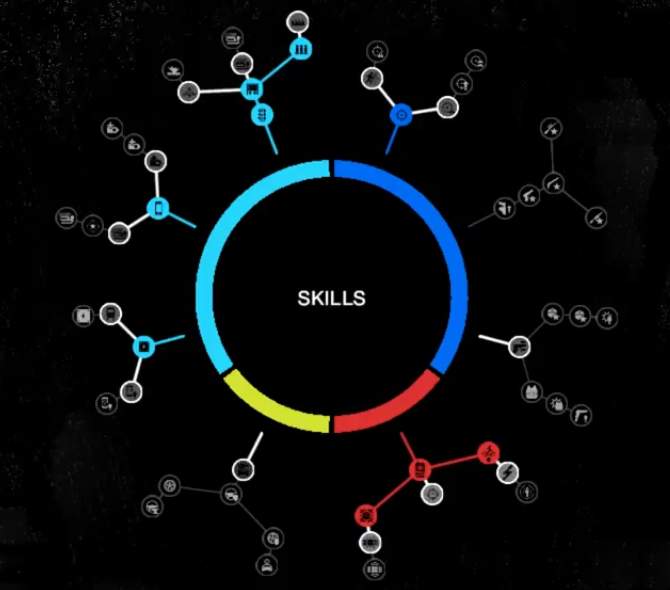I played a ton of video games growing up. The ones that really caught my attention were the ones with deep character development. I was excited by the gameplay, but I was driven to keep playing because of what my character could achieve. I wanted Batman to be able to throw two batarangs instead of one. I wanted Spider-Man to be able to swing rockets back at the bad guys. The only way to get these cool abilities was to play through the game.
Main characters in modern gaming usually acquire their new skills through the magic of skill trees. As your character moves on in a game, he or she earns points, which is the game’s currency for your character’s skills. Once you’ve earned a certain amount of points, you could pick a new skill for your character to “learn” (Batman has ALWAYS known how to throw two batarangs).

Similar to playing a game and developing your character, wouldn’t it be great if we can explain complex subjects, like music education, through skill trees? Now, it wouldn’t be the same instantaneous gratification that video game characters experience. Trust me, I wish I could click on a button and download the knowledge to fly a helicopter like in The Matrix. However, I believe that there are 5 benefits of using skill trees for music education. When presented clearly, they are the best way to learn. Let’s take a look.
1. Fundamentals
Skill trees are essentially tree diagrams. One node is connected to another and that node is connected to another node. Once you zoom out, you can see there’s a relationship between various nodes. Depending on that number, it can look complex and overwhelming, but you should be able to trace everything back to the original node.
At Bandora, the original node is basic music notation. Music theory is fundamental to one’s education. Without it, it can be difficult to explain and communicate its concepts. Playing music is one thing but understanding it is often something people skip.
2. Filling in the Gaps
Have you ever half-learned something or didn’t fully grasp a concept? Well if one of those concepts is music, then our skill tree can help fill in those gaps in your knowledge of music.
Using a skill tree can help anyone learning music, trace the path of learning to its roots (music theory) and build a foundation for learning music going forward. It also helps ensure that anyone learning on Bandora is on the same page.
I assume everyone is learning at different levels, from beginner to advanced. Most people learn a thing or two in school growing up. However, music is a language. In a similar way, continuous practice is key to becoming fluent. If you remember everything you learned about music in grade school, great! If not, using a skill tree can help pick up where you left off.
3. Path of Learning Visualized
Bandora doesn’t offer a typical online course format where there’s a clear beginning and end. Someone can come in and start where they want and stop where they want based on lesson availability. If a student has a goal in mind, they can trace the lessons that they would need in order to achieve that goal.
For example, you can play an open C chord on guitar. If you want to understand what you’re playing, you can trace the lessons that lead to that lesson. All the lessons are connected to another lesson so you can see how certain music concepts are related. You can see the necessary steps it takes to achieve your goals in learning music.
4. Choose Your Own Adventure
This is probably the most exciting benefit of using skill trees. It’s a choose-your-own-adventure system. Based on your goal as a budding musician, you can tailor your learning experience.
Is music just a hobby and you just want to learn songs to play? Maybe you shouldn’t take too many music theory lessons and focus on learning how to play an instrument. You don’t need the theory behind an open C chord to play it.
Are you interested in songwriting? Maybe you should focus on theory and playing chords, but not playing “Flight Of The Bumblebee” on guitar (unless you want to…).
Do you want to be a pro and work as a studio musician? You would probably have to learn everything you could, as well as have a good ear.
The point is you can choose your own path if music lessons were laid out like a skill tree. Visualize your path to achieve your music education goals and enjoy the adventure!
5. Flexibility
We’ve already established the last 4 benefits from a learning perspective, but this also benefits instructors. As Bandora adds new lessons, new connections are added as well. New paths of learning are created. More instrument instruction can be added easily since the fundamentals and foundation are already there. For example, if we wanted to add flute lessons, we don’t have to teach music theory again. They are already there to supplement a student’s learning experience.
Using skill trees isn’t new in education. Duolingo, a popular app for learning a new language, is organized in a similar way. The gamification on the app is top-notch and the progression is natural to each language because they start with the basics.
Now that you have learned the benefits of skill trees, head over to Bandora to start your music education. See you there!

